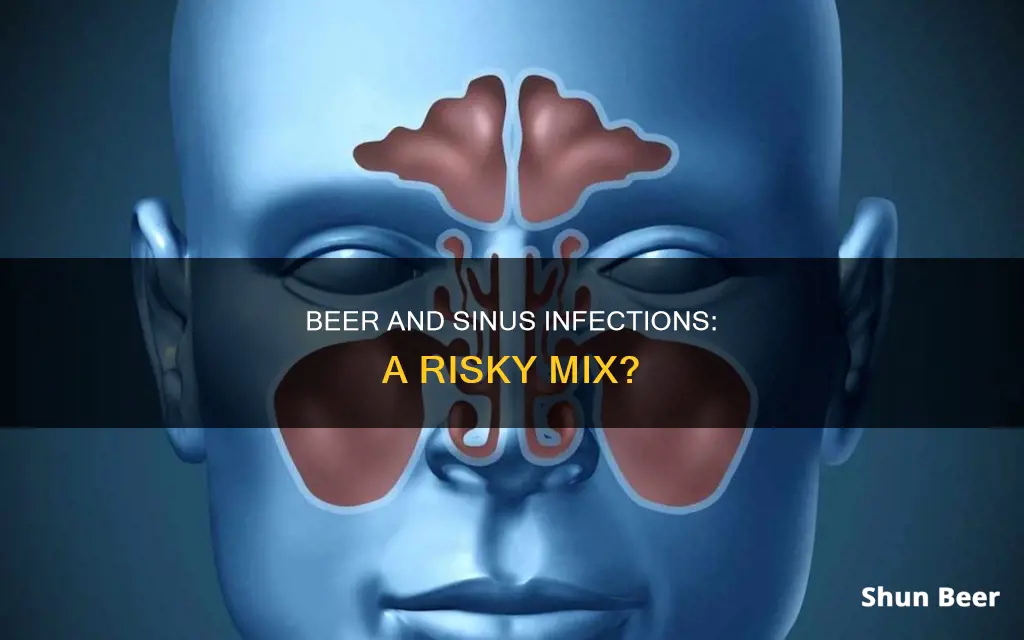
Drinking alcohol is generally not recommended for people suffering from sinus infections. Alcohol can cause nasal congestion and sinus pain due to its impact on the digestive, immune, and circulatory systems, leading to swelling, inflammation, and increased mucus production. Additionally, alcohol is a diuretic that can dehydrate the body, further thickening the mucus membranes and exacerbating sinus symptoms. However, some people believe that alcohol can act as a decongestant, and there is a remedy that includes whiskey, lemon juice, honey, and boiling water. While this remedy may provide temporary relief, there is limited medical research to support its effectiveness. It is always best to consult with a doctor to determine the underlying cause of sinus pain and receive appropriate guidance on managing sinus infections.
| Characteristics | Values |
|---|---|
| Should you drink beer with a sinus infection? | No |
| Why? | Alcohol dehydrates the body and can cause the nose and nasal cavities to swell, exacerbating sinus infection symptoms. |
| Alternatives | Drinking hot liquids like tea or soup can help break down the stuffiness and mucus in your nasal cavities. |
What You'll Learn

Beer can worsen nasal symptoms
Drinking beer or any alcoholic beverage is not recommended when you have a sinus infection. Alcohol can dehydrate the body, causing the nose and nasal cavities to swell, which exacerbates your symptoms.
Alcohol impacts the body in several ways, including chemical reactions in the digestive system, immune system, and circulatory system. Each of these systems can affect the sinuses, leading to swelling, inflammation, and increased mucus production. The degree of impact depends on your ability to digest and metabolize alcohol.
When you have a sinus infection, your body is already dehydrated, and alcohol consumption further contributes to dehydration. This dehydration thickens the mucus membranes in the body, leading to nasal congestion. In addition, alcohol triggers chemical reactions that cause swelling of the blood vessels, resulting in a flushed face and swollen sinuses. This irritation of the cilia, the small hair-like structures that protect the nasal passages, leads to congestion.
In some individuals, alcohol intolerance or allergies may be present, which can worsen the reaction to alcohol consumption. Alcohol intolerance is often characterised by nasal congestion and can be due to a deficiency in ALDH2 enzymes, which are responsible for processing alcohol in the body. Alcohol allergies, on the other hand, are immune responses to ingredients in alcohol other than ethanol, such as grains or preservatives. Both intolerances and allergies can lead to nasal congestion, among other symptoms.
Therefore, it is generally advised to avoid drinking alcohol when suffering from a sinus infection. Instead, focus on staying hydrated by drinking plenty of water and herbal tea, which can help alleviate congestion and mucus build-up.
The Best Beer to Drink: A Comprehensive Guide
You may want to see also

Alcohol can cause nasal congestion
Drinking alcohol can cause nasal congestion, which is a common symptom of alcohol consumption. This is due to the effects of alcohol on the blood vessels in the body. Alcohol causes vasodilation, which is the dilation or expansion of blood vessels. As blood vessels expand and swell, they transport more blood, leading to a flushed or red appearance on the skin. This swelling also occurs in the nose, causing the lining of the nose and the turbinates (filters of the nose) to swell and produce congestion.
The relationship between alcohol consumption and sinus congestion is well-documented. Alcohol impacts the body in various ways, including chemical reactions in the digestive system, immune system, and circulatory system. These systems can influence the sinuses, leading to swelling, inflammation, and increased mucus production. The degree of impact depends on an individual's ability to digest and metabolize alcohol.
The process of metabolizing alcohol involves breaking down ethanol into waste products that the body can easily eliminate. In the liver, the enzyme alcohol dehydrogenase (ADH) converts ethanol into acetaldehyde. Another enzyme, aldehyde dehydrogenase 2 (ALDH2), then breaks down acetaldehyde into acetate. This step is crucial and must occur rapidly to avoid unpleasant side effects. Finally, acetate is further metabolized into water and carbon dioxide, which are expelled from the body.
However, some people experience alcohol intolerance, a metabolic disorder characterized by a temporary but uncomfortable reaction to alcohol. This condition is caused by a deficiency or ineffectiveness of ALDH2 enzymes, leading to a buildup of acetaldehyde in the body. Alcohol intolerance can result in nasal congestion, skin flushing, increased heart rate, lower blood pressure, and worsening of asthma symptoms. It is an inherited genetic condition passed down from parent to child.
Additionally, alcohol can trigger a histamine reaction (allergic reaction) in the nose, causing congestion or a runny nose. Certain ethnicities, such as Asians, have inherited genetic traits that increase their risk of experiencing this reaction. Beer and wine contain high levels of histamine, which can contribute to nasal congestion. Therefore, avoiding these types of alcoholic beverages may help reduce congestion symptoms.
Beer and Gout: Is There a Link?
You may want to see also

Sinus infections and alcohol can lead to dehydration
Drinking alcohol when you have a sinus infection is generally not recommended. Alcohol acts as a diuretic, causing excess water to be released from the body. This can lead to dehydration, which in turn thickens the mucus membranes in the body, leading to nasal congestion.
Dehydration can cause the mucus inside your sinuses to become thick, making it harder for the cilia to push the mucus along. If the mucus stays inside your sinuses for longer than it should, you are at risk of developing a sinus infection or sinusitis. Sinusitis is an inflammation of the sinuses or the air-filled cavities in the face. It occurs when fluid builds up in the sinuses, allowing germs to grow.
When you are already suffering from a sinus infection, dehydration can worsen your symptoms. Sinus infections can leave you dehydrated, and alcohol will continue to dehydrate you, leading to worsening sinus symptoms.
To prevent dehydration, it is important to drink plenty of water and care for your sinuses. Water helps to keep mucus thin and loose, allowing it to be easily drained from the nasal passages. This is crucial for maintaining sinus health and preventing infections.
In addition to staying hydrated, there are other ways to keep your sinuses healthy and prevent infections. These include avoiding cigarette smoke and common allergens, keeping your sinuses moist, and getting recommended vaccines such as the flu vaccine and COVID-19 vaccine.
Beer Cans: Safe Drinking Vessels?
You may want to see also

Alcohol intolerance and allergies can cause congestion
The symptoms of alcohol intolerance are the same regardless of the type of alcoholic beverage consumed. In addition to congestion, individuals with alcohol intolerance may experience flushing, rapid heart rate, headache, low blood pressure, hives, runny nose, and stomach pain. These symptoms can lead to major health problems, including an increased risk of cancers of the mouth, throat, esophagus, stomach, and liver.
Allergic reactions to alcohol can also cause congestion, along with other symptoms such as difficulty breathing, coughing, runny nose, and stomach upset. These reactions are triggered by an immune system response to ingredients in alcoholic beverages, such as chemicals, grains, or preservatives. Even small amounts of alcohol can cause symptoms in individuals with a true alcohol allergy.
It is worth noting that alcohol itself can cause congestion by triggering chemical reactions in the body that lead to swelling of the blood vessels and sinuses. This can result in sinus infections that can last from three to twelve weeks. Therefore, it is generally recommended to avoid drinking alcohol when suffering from any kind of sinus infection or similar condition.
If you experience congestion or other adverse reactions after consuming alcohol, it is important to consult a doctor to determine the underlying cause and receive appropriate guidance on managing your condition.
Firearm Safety: Beer and Gun Handling
You may want to see also

Drinking alcohol with a sinus infection is not recommended
Drinking Alcohol with a Sinus Infection: What You Need to Know
Dehydration
Alcohol is a diuretic, which means it increases the body's urine production and fluid loss. When you're already dealing with a sinus infection, dehydration can worsen the condition by thickening the mucus membranes in your body, leading to increased nasal congestion and discomfort. Staying properly hydrated is crucial for managing sinus infections effectively.
Allergic Reactions
Alcoholic beverages, especially wine, beer, and spirits, contain histamines, which are known to trigger allergic reactions. These histamines can cause inflammation in the blood vessels, including those in your nasal passages, leading to congestion and exacerbating existing sinus issues. People with allergies or asthma should be particularly cautious as alcohol can trigger symptoms and make breathing more difficult.
Disruption of Sinus Health
Alcohol consumption can have a direct impact on your sinus health. It can cause swelling of the sinuses and irritate the cilia, the small hair-like structures that protect your nasal passages from debris. This irritation can lead to congestion and even sinus infections that may last for several weeks. Protecting the cilia and maintaining healthy sinuses are essential for overall respiratory health.
Indigestion and Acid Reflux
Alcohol consumption can also lead to indigestion and acid reflux, which can indirectly contribute to sinus issues. The sensitive lining of your sinuses can become inflamed due to acid reflux, even if you don't typically experience noticeable reflux symptoms. This inflammation can then develop into sinusitis. Therefore, it's best to avoid alcohol to minimize the risk of aggravating your sinus infection.
Lack of Nutritional Value
Alcoholic beverages, unlike other drinks, do not provide significant nutritional benefits. When recovering from a sinus infection, it's important to focus on consuming drinks and foods that support your immune system and overall health. Opting for water, herbal teas, and nutrient-rich options will help keep your body hydrated and provide the necessary fuel for recovery.
While it may be tempting to reach for an alcoholic beverage, especially with the belief that it may act as a decongestant, the potential negative consequences on your sinus health and overall well-being outweigh any perceived benefits. It's best to consult with a healthcare professional to determine the most suitable treatment options for your sinus infection.
Crafting Gin and Ginger Beer Cocktails at Home
You may want to see also
Frequently asked questions
It is generally recommended that you avoid drinking alcohol if you are suffering from any kind of sinus infection. Alcohol can cause dehydration, which can lead to swelling and inflammation that blocks the nasal and sinus area.
Beer contains hops and yeast, which convert to a form of sugar in the body. Allergies to yeast or an intolerance to alcohol can develop at any time, as the body changes every few years. Alcohol also acts as a diuretic, causing dehydration, which can worsen sinus symptoms.
Drinking alcohol with a sinus infection can lead to serious complications such as obstructed airways due to allergies. Alcohol can also trigger asthma attacks in patients who have previously been diagnosed with asthma. It can also cause wheezing in non-asthmatic patients.
Water is a good option to stay hydrated during recovery. Peppermint, chamomile, eucalyptus, wild thyme, and blackberry teas can also help clear congestion.







